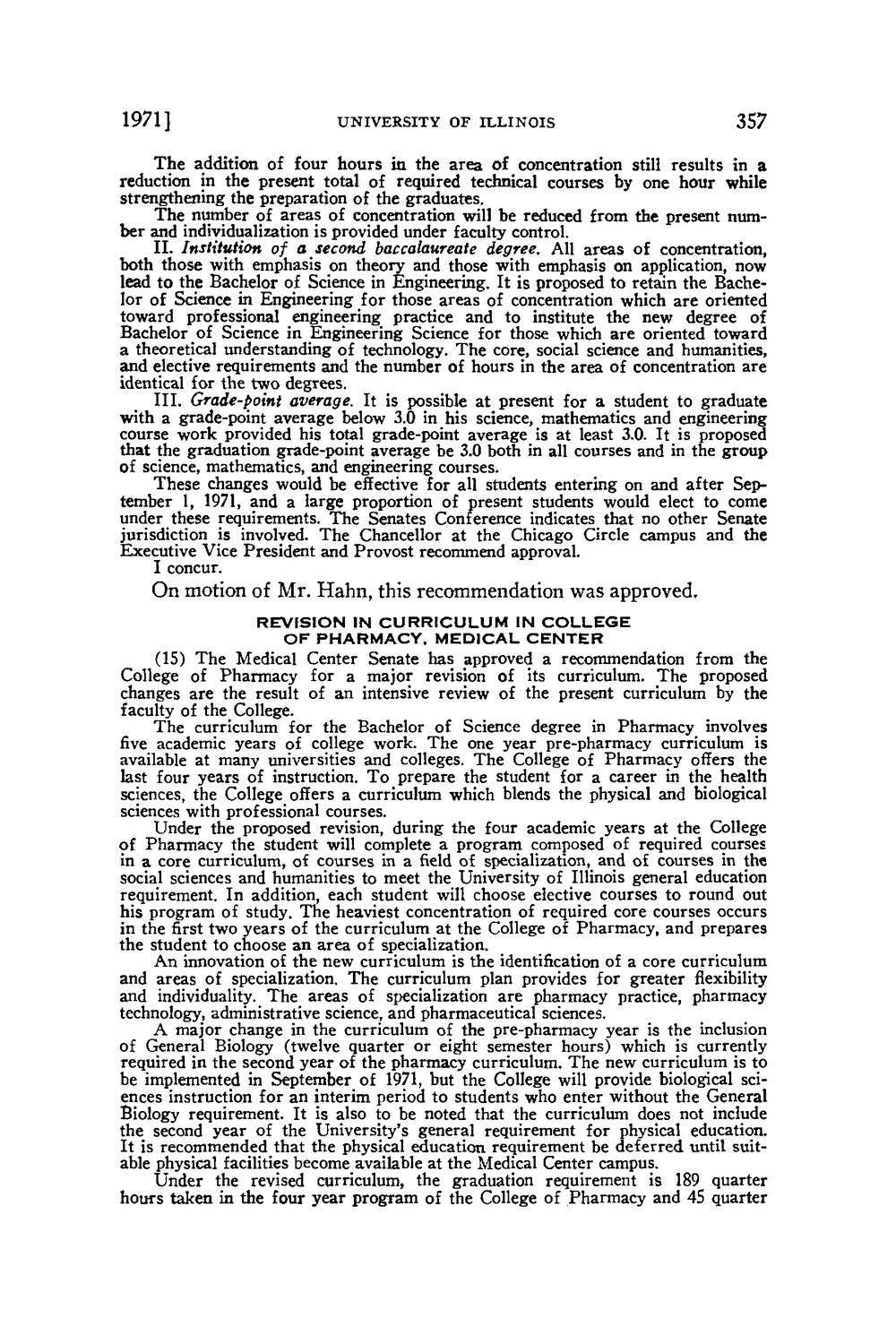| |
| |
Caption: Board of Trustees Minutes - 1972
This is a reduced-resolution page image for fast online browsing.

EXTRACTED TEXT FROM PAGE:
1971] UNIVERSITY OF ILLINOIS 357 The addition of four hours in the area of concentration still results in a reduction in the present total of required technical courses by one hour while strengthening the preparation of the graduates. The number of areas of concentration will be reduced from the present number and individualization is provided under faculty control. II. Institution of a second baccalaureate degree. All areas of concentration, both those with emphasis on theory and those with emphasis on application, now lead to the Bachelor of Science in Engineering. It is proposed to retain the Bachelor of Science in Engineering for those areas of concentration which are oriented toward professional engineering practice and to institute the new degree of Bachelor of Science in Engineering Science for those which are oriented toward a theoretical understanding of technology. The core, social science and humanities, and elective requirements and the number of hours in the area of concentration are identical for the two degrees. III. Grade-point average. It is possible at present for a student to graduate with a grade-point average below 3.0 in his science, mathematics and engineering course work provided his total grade-point average is at least 3.0. It is proposed that the graduation grade-point average be 3.0 both in all courses and in the group of science, mathematics, and engineering courses. These changes would be effective for all students entering on and after September 1, 1971, and a large proportion of present students would elect to come under these requirements. The Senates Conference indicates that no other Senate jurisdiction is involved. The Chancellor at the Chicago Circle campus and the Executive Vice President and Provost recommend approval. I concur. On motion of Mr. Hahn, this recommendation was approved. REVISION IN C U R R I C U L U M IN COLLEGE OF PHARMACY. MEDICAL CENTER (15) The Medical Center Senate has approved a recommendation from the College of Pharmacy for a major revision of its curriculum. The proposed changes are the result of an intensive review of the present curriculum by the faculty of the College. The curriculum for the Bachelor of Science degree in Pharmacy involves five academic years of college work. The one year pre-pharmacy curriculum is available at many universities and colleges. The College of Pharmacy offers the last four years of instruction. To prepare the student for a career in the health sciences, the College offers a curriculum which blends the physical and biological sciences with professional courses. Under the proposed revision, during the four academic years at the College of Pharmacy the student will complete a program composed of required courses in a core curriculum, of courses in a field of specialization, and of courses in the social sciences and humanities to meet the University of Illinois general education requirement. In addition, each student will choose elective courses to round out his program of study. The heaviest concentration of required core courses occurs in the first two years of the curriculum at the College of Pharmacy, and prepares the student to choose an area of specialization. An innovation of the new curriculum is the identification of a core curriculum and areas of specialization. The curriculum plan provides for greater flexibility and individuality. The areas of specialization are pharmacy practice, pharmacy technology, administrative science, and pharmaceutical sciences. A major change in the curriculum of the pre-pharmacy year is the inclusion of General Biology (twelve quarter or eight semester hours) which is currently required in the second year of the pharmacy curriculum. The new curriculum is to be implemented in September of 1971, but the College will provide biological sciences instruction for an interim period to students who enter without the General Biology requirement. It is also to be noted that the curriculum does not include the second year of the University's general requirement for physical educationIt is recommended that the physical education requirement be deferred until suitable physical facilities become available at the Medical Center campus. Under the revised curriculum, the graduation requirement is 189 quarter hours taken in the four year program of the College of Pharmacy and 45 quarter
| |